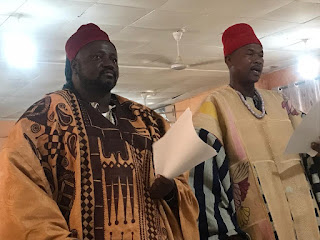UE-RHC OF CHIEFS SWEARS IN NEW PREZ & VICE 23RD OCTOBER, 2020
The Upper East Regional House of Chiefs [UE-RHC] has
sworn into office two new executives, the President and his Vice to lead the
House for the next four years. They are the Paramount chief for the Chiana
traditional area, PƐ Ditungdini Adiali Ayagitam
III and Naba Anonsona Anthony Abisa III of the Mirigu traditional area respectively.
Together, they take over from the immediate past President, the Naga Naba and
his Vice, the Bo-Naba.
PƐ Ditungdini [1st from left] & His Vice taking oaths
The Bolgatanga High Court-two Judge, His Lordship Justice Asmah Akwasi Aseidu who administered the official oaths on the two simultaneously, stated that they were legally recognised and empowered by the law to lead and give direction to the House as mandated by the positions they occupied and wished them well.
In his maiden address to the House delivered shortly thereafter, President PƐ Ditungdini on behalf of his Vice, thanked his colleague chiefs for electing them last month and promised to the House; “I assure you that the trust you have expressed in us shall not be betrayed. We shall work diligently to justify your overwhelming decision”. He also commended the Electoral Commission for its peaceful and orderly conduct of the House’s elections during the period and hoped same will be exhibited in the December 2020 general elections.
The President noted that “the chieftaincy institutions has been a sacred domain several decades ago not only because it involved chiefs and their subjects but because it is the traditional apparatus that upholds the sanctity and ancestral values of our people”. He stressed that these values are jealously kept and passed from generation to generation as they embody what constitutes a people and what they stand for.
He charged his colleagues to team up effectively for the quick resolution of outstanding chieftaincy disputes as this will bring about peace and harmony across the region paving the way for the needed development so desired by the people. He pledged to restructure departments and committees of the House to position them properly for the effective discharge of their responsibilities while the infrastructure of the House will be worked on and upgraded to a befitting status.
The Chiana Pio applauded the Upper East Regional
Minister some renovation works and installation of air conditions she did in
the recent past but called for continuous financial and other forms of support
in order to enable it discharge its mandate effectively. He said it is hope to
introduce a common ICT platform within his tenure so that members could engage
in business of the House whenever they were on the move or out of the
jurisdiction.
While he praised government for the Pwalugu
Multipurpose Dam Project, he requested that an additional dam be built at
either Kobore or Mognori to further strengthen the region’s agribusiness base.
Meanwhile, he also called for the establishment of a Cattle Development Board
and the actualisation of government’s intentions to reactivate the Bolgatanga
meat factory and the tomato factory at Pwalugu.

PƐ Ditungdini giving his maiden address
It is the wish of PƐ Ditungdini to scrap the membership of Divisional Chiefs in the House by making a strong case to the National House of Chiefs for their elevation to paramountcies. He appealed to his colleagues and other stakeholders to join forces in making this noble intention a reality.
Deputy Upper East Regional Minister, Hon. Frank Fuseni Adongo in a speech read to the House on his behalf by the Regional Coordinating Director who is also the chief of Gumbo, observed that since the colonial era to date, traditional authorities have become important “linking bridges” in the administration of rural communities. He said for instance, government had in the past and will continue to call on chiefs as intermediaries in their dealings with the people in the areas of electoral mobilisation, tax collection, law and order among others.
According to the Deputy Minister, up to 90 percent of ordinary Ghanaians, both urban and rural believe and depend on the traditional authority system to organise their live despite the existence of modern state structures. This he remarked, resulted from the high respect the chieftaincy institution continuous to command from the populace.


.jpeg)
Comments